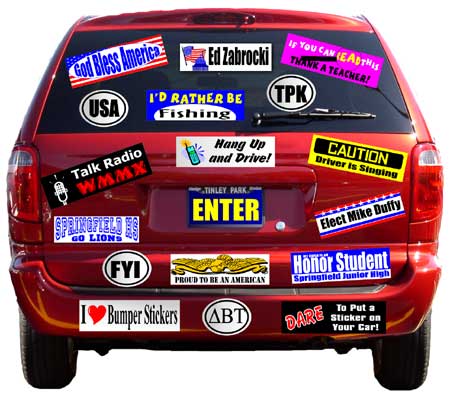The type of car can communicate a persons level of affluence. The initial reaction is very different when one sees someone driving in a Ferrari versus a Kia: a Ferrari alludes to wealth, while a Kia alludes to a less affluent driver. It can also convey interests: if a person is driving a Prius, they are inherently environmentally conscious, verus a driver who is sporting a Hummer, who hypothetically, is not environmentally attune. In addition, is one is driving a vintage vehicle, they value car character over function. On a micro level, at Babson College, many are defined by the car they drive. Conversations are flooded with "Did you see that Bentley in the parking lot?" or "Can you BELIEVE he drives an Escalade? I didn't know he was wealthy...".On a macro level, when we drive on the highway and see a BMW or Porsche, we automatically categorize the driver as wealthy.
Cars can define our lives. For example, when my car is neat, my life is organized. On the contrary, when my car is filled with papers, coffee cups, tanning lotion, and clothes, it shows my life is hectic. If one sees softball bats in the trunk, chances are the person is an athlete. One can learn realms about an individuals lives by looking through the drivers personal artifacts in a car. It also communicates our personal preferences: when one turns on the car, the radio automatically blasts music. If it's on a rap station, the person prefers rap music--as opposed to a CD with club music, which means the person likes house music.
Bumper stickers convey our personal beliefs. When driving, bumper stickers serve as a sub-medium to communicate their views pertaining to politics, academia, or general personality characteristics. If one has a bumper sticker stating, "I Love George Bush", we make the assumption they are a Republican. If we see a bumper sticker with stating "Proud Honor Student", we assume they are intelligent. If we see a sticker stating, "Texas A&M University", we assume they (or one of their family members) attend that university. Bumper stickers open the door to the general public and openly display minuscule pieces of your personal beliefs.
However, there are obviously cases where these are false accusations. Following Croteau and Hoynes logic, this mechanical representation does not necessarily reflect the economic interests, personal beliefs, or level of affluence. This medium can yield stereotypes and can paint a broad misrepresentation of a persons greater lifestyle. In addition, I would argue these are negative mediums, and serve as an easy channel for categorizing individuals and compartmentalizing the masses into mechanical boxes.
 |
| Vintage Car = Car Lover |
 |
| Leather Interior: Affluence |
 |
| BMW = Wealth |
 |
| Ferrari = Car Lover |
 |
| Old Car = Less Affluent |
 |
| Prius = Environmentally Conscious |
 |
| Hummer = Not Environmentally Conscious |
 |
| Honda = Functionality |
 |
| Bumper Stickers = Personal Beliefs |
 |
| Interior of Car = Chaotic Life |

I agree with what you said and it is funny to see how in America the cars you stereotype people you see a different type of stereotype in a Latin American country like in Brazil. First of all in Brazil you barely see nice cars like Ferrari's, Taxes in Brazil are X2 as much as in the USA. So if someone has a Ferrari they are very rich. Second of all, even the rich people in Brazil do not ride nice cars. If their car is low profile the better for them. One thing people avoid in Brazil is to call attention. So in Brazil you see the wealthiest people driving around bullet proof normal cars like ford fusions. Criminals or drug dealers normally drive SUV such as land rovers etc.
ReplyDeleteVery interesting post! Jose's argument blows my mind--apparently cars DON'T HAVE TO BE a status symbol at all! What makes one culture so distinct from another? This is something worth looking into.
ReplyDeleteCars' relation with capitalism is inseparable. See the book Automobilities (2005) edited by Featherstone, Urry and Thrift. The subject is so huge. It'll work better if narrowed down.